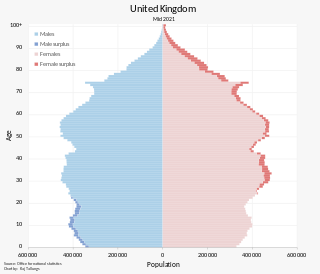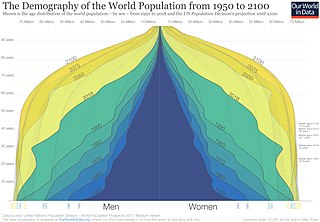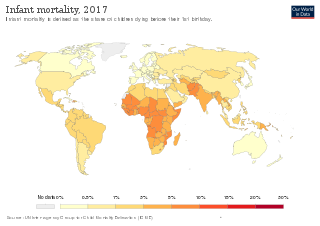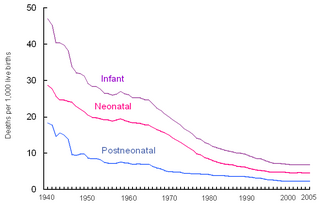
Human life expectancy is a statistical measure of the estimate of the average remaining years of life at a given age. The most commonly used measure is life expectancy at birth. This can be defined in two ways. Cohort LEB is the mean length of life of a birth cohort and can be computed only for cohorts born so long ago that all their members have died. Period LEB is the mean length of life of a hypothetical cohort assumed to be exposed, from birth through death, to the mortality rates observed at a given year. National LEB figures reported by national agencies and international organizations for human populations are estimates of period LEB.

The population of the United Kingdom was estimated at 67,596,281 in 2022. It is the 21st most populated country in the world and has a population density of 279 people per square kilometre, with England having significantly greater density than Wales, Scotland, and Northern Ireland. Almost a third of the population lives in south east England, which is predominantly urban and suburban, with 8,866,180 people in the capital city, London, whose population density was 5,640 inhabitants per square kilometre (14,600/sq mi) in 2022.

Demography is the statistical study of human populations: their size, composition, and how they change through the interplay of fertility (births), mortality (deaths), and migration.

Infant mortality is the death of an infant before the infant's first birthday. The occurrence of infant mortality in a population can be described by the infant mortality rate (IMR), which is the number of deaths of infants under one year of age per 1,000 live births. Similarly, the child mortality rate, also known as the under-five mortality rate, compares the death rate of children up to the age of five.

Mortality rate, or death rate, is a measure of the number of deaths in a particular population, scaled to the size of that population, per unit of time. Mortality rate is typically expressed in units of deaths per 1,000 individuals per year; thus, a mortality rate of 9.5 in a population of 1,000 would mean 9.5 deaths per year in that entire population, or 0.95% out of the total. It is distinct from "morbidity", which is either the prevalence or incidence of a disease, and also from the incidence rate.

The Lancet, one of the oldest scientific medical journals in the world, published two peer-reviewed studies on the effect of the 2003 invasion of Iraq and subsequent occupation on the Iraqi mortality rate. The first was published in 2004; the second in 2006. The studies estimate the number of excess deaths caused by the occupation, both direct and indirect.

Population ecology is a sub-field of ecology that deals with the dynamics of species populations and how these populations interact with the environment, such as birth and death rates, and by immigration and emigration.

In actuarial science and demography, a life table is a table which shows, for each age, the probability that a person of that age will die before their next birthday. In other words, it represents the survivorship of people from a certain population. They can also be explained as a long-term mathematical way to measure a population's longevity. Tables have been created by demographers including John Graunt, Reed and Merrell, Keyfitz, and Greville.

Perinatal mortality (PNM) is the death of a fetus or neonate and is the basis to calculate the perinatal mortality rate. Perinatal means "relating to the period starting a few weeks before birth and including the birth and a few weeks after birth."

A fishery is an area with an associated fish or aquatic population which is harvested for its commercial or recreational value. Fisheries can be wild or farmed. Population dynamics describes the ways in which a given population grows and shrinks over time, as controlled by birth, death, and migration. It is the basis for understanding changing fishery patterns and issues such as habitat destruction, predation and optimal harvesting rates. The population dynamics of fisheries is used by fisheries scientists to determine sustainable yields.
Fish mortality is a parameter used in fisheries population dynamics to account for the loss of fish in a fish stock through death. The mortality can be divided into two types:

Aeromonas salmonicida is a pathogenic bacterium that severely impacts salmonid populations and other species. It was first discovered in a Bavarian brown trout hatchery by Emmerich and Weibel in 1894. Aeromonas salmonicida's ability to infect a variety of hosts, multiply, and adapt, make it a prime virulent bacterium. A. salmonicida is an etiological agent for furunculosis, a disease that causes sepsis, haemorrhages, muscle lesions, inflammation of the lower intestine, spleen enlargement, and death in freshwater fish populations. It is found worldwide with the exception of South America. The major route of contamination is poor water quality; however, it can also be associated stress factors such as overcrowding, high temperatures, and trauma. Spawning and smolting fish are prime victims of furunculosis due to their immunocompromised state of being.
In 2006, life expectancy for males in Cyprus was 79 and for females 82 years. Infant mortality in 2002 was 5 per 1,000 live births, comparing favourably to most developed nations.
Morbidity and mortality may refer to:

Rosa Mabel Lee (1884-1976) was a British statistician, the first woman scientist to be employed by the Marine Biological Association and the first woman to work as a government fishery scientist in the United Kingdom.
COVID-19 deaths may refer to:

This article contains the number of confirmed COVID-19 deaths per population as of 28 January 2025, by country. It also has cumulative death totals by country. For these numbers over time see the tables, graphs, and maps at COVID-19 pandemic deaths and COVID-19 pandemic by country and territory.












